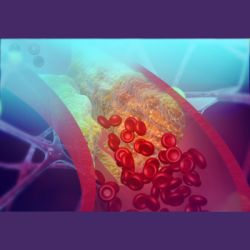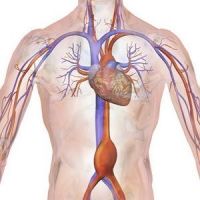Imagine this: A doctor in New York City remotely performing long-distance, telerobotic ultrasound exams over the internet on patients in Chicago. This telerobotic imaging approach is, in fact, currently being tested by cardiovascular imaging specialists of Icahn School of Medicine at Mount Sinai in New York and Rush University Medical Center in Chicago.
The pioneering study is investigating if remote, long-distance telerobotic ultrasound exams of the carotid artery in the neck could be just as efficient as traditional, in-person manual ultrasound exams to test for signs of carotid intima-media thickness and carotid atherosclerotic plaque which are risk factors for cardiovascular events, such as heart attack and stroke.
The clinical trial, with 100 study participants over the age of 60 in Chicago at Rush, utilises a small, robotic arm outfitted with ultrasound technology and connected to a personal computer with a standard internet connection. The robot is controlled over the internet by a Mount Sinai New York cardiovascular specialist and can complete a scan of the carotid artery in just four minutes. In addition, each patient will also receive a manual, in-person ultrasound exam by Rush to compare diagnostic results.
This telehealth breakthrough is made possible by the rapid evolution of imaging technology. The novel telerobotic healthcare technology being used for this clinical trial is called TRUDI (Tele-Robotic Ultrasound for Distance Imaging). “Our platform brings together remotely controllable robotics, ultrasound, and telepresence to allow an experienced operator located anywhere in the world to perform an ultrasound exam at a distance,” explained Jeffrey Soble, MD, Associate Professor of Cardiology at Rush University Medical Center, who is one of TRUDI's creators. TRUDI is a product of the company TeleHealthRobotics, which Dr. Soble co-founded with biomedical engineer Sarah Doherty.
“Launching long-distance, telerobotic ultrasound exams between two major hospitals in two large cities is a sign that we may be able to make waves in accelerating access to and cost-effectiveness of this critical heart health imaging diagnostic tool to other cities, small towns, or rural communities in need,” said Partho P. Sengupta, MD, the study’s principal investigator at Mount Sinai and Director of Interventional Echocardiography and Cardiac Ultrasound Research, and Associate Professor of Medicine (Cardiology) at Icahn School of Medicine at Mount Sinai.
The pioneering clinical trial in the US builds upon the recent research breakthrough collaboration of Mount Sinai and TeleHealthRobotics’ technology using remote, long-distance robotic-assisted ultrasound imaging internationally.
While in Germany, Mount Sinai’s Dr. Sengupta used TRUDI to perform the first robot-assisted transatlantic ultrasound exam on a person in Boston. “Our successful first-in-man international experiment opened up a new frontier for the use of remote, robotic ultrasound imaging that could potentially be more efficient and cost-effective overall for healthcare delivery,” Dr. Sengupta noted.
In another study, Mount Sinai and collaborators in Sweden tested the feasibility of similar telerobotic ultrasound technology within Sweden for heart failure patients at a remote primary care centre located a far distance from the nearest Swedish hospital.
“Our recent research breakthroughs give us a glimpse of what to expect in the near future, a patient-friendly imaging technology at your doorstep,” said Jagat Narula, MD, PhD, Mount Sinai’s Director of Cardiovascular Imaging and senior investigator for the Swedish study.
Source and image credit: Mount Sinai Medical Center
The pioneering study is investigating if remote, long-distance telerobotic ultrasound exams of the carotid artery in the neck could be just as efficient as traditional, in-person manual ultrasound exams to test for signs of carotid intima-media thickness and carotid atherosclerotic plaque which are risk factors for cardiovascular events, such as heart attack and stroke.
The clinical trial, with 100 study participants over the age of 60 in Chicago at Rush, utilises a small, robotic arm outfitted with ultrasound technology and connected to a personal computer with a standard internet connection. The robot is controlled over the internet by a Mount Sinai New York cardiovascular specialist and can complete a scan of the carotid artery in just four minutes. In addition, each patient will also receive a manual, in-person ultrasound exam by Rush to compare diagnostic results.
This telehealth breakthrough is made possible by the rapid evolution of imaging technology. The novel telerobotic healthcare technology being used for this clinical trial is called TRUDI (Tele-Robotic Ultrasound for Distance Imaging). “Our platform brings together remotely controllable robotics, ultrasound, and telepresence to allow an experienced operator located anywhere in the world to perform an ultrasound exam at a distance,” explained Jeffrey Soble, MD, Associate Professor of Cardiology at Rush University Medical Center, who is one of TRUDI's creators. TRUDI is a product of the company TeleHealthRobotics, which Dr. Soble co-founded with biomedical engineer Sarah Doherty.
“Launching long-distance, telerobotic ultrasound exams between two major hospitals in two large cities is a sign that we may be able to make waves in accelerating access to and cost-effectiveness of this critical heart health imaging diagnostic tool to other cities, small towns, or rural communities in need,” said Partho P. Sengupta, MD, the study’s principal investigator at Mount Sinai and Director of Interventional Echocardiography and Cardiac Ultrasound Research, and Associate Professor of Medicine (Cardiology) at Icahn School of Medicine at Mount Sinai.
The pioneering clinical trial in the US builds upon the recent research breakthrough collaboration of Mount Sinai and TeleHealthRobotics’ technology using remote, long-distance robotic-assisted ultrasound imaging internationally.
While in Germany, Mount Sinai’s Dr. Sengupta used TRUDI to perform the first robot-assisted transatlantic ultrasound exam on a person in Boston. “Our successful first-in-man international experiment opened up a new frontier for the use of remote, robotic ultrasound imaging that could potentially be more efficient and cost-effective overall for healthcare delivery,” Dr. Sengupta noted.
In another study, Mount Sinai and collaborators in Sweden tested the feasibility of similar telerobotic ultrasound technology within Sweden for heart failure patients at a remote primary care centre located a far distance from the nearest Swedish hospital.
“Our recent research breakthroughs give us a glimpse of what to expect in the near future, a patient-friendly imaging technology at your doorstep,” said Jagat Narula, MD, PhD, Mount Sinai’s Director of Cardiovascular Imaging and senior investigator for the Swedish study.
Source and image credit: Mount Sinai Medical Center
Latest Articles
robotics, Ultrasound, carotid artery, cardiovascular events, telerobotic imaging
Imagine this: A doctor in New York City remotely performing long-distance, telerobotic ultrasound exams over the internet on patients in Chicago. This tele...



























